Links to various Aetna Better Health and non-Aetna Better Health sites are provided for your convenience. Aetna Better Health of California is not responsible or liable for non-Aetna Better Health content, accuracy or privacy practices of linked sites or for products or services described on these sites.
Our neighborhood health story: Working to improve the health of southwest Virginia
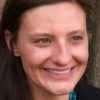 By Bonnie Vengrow
By Bonnie Vengrow
Caring for southwest Virginia
My name is Dorothy Faye Talbot. I was born 12/31/1937.
Its 13 years I’ve been going to the RAM event, I didn’t know that I had cancer until I went to the RAM event.
Doctor Joe Smiddy has one of the great big vans with the X ray machine. When I went over, he took an x-ray, my right lung had a large mass in it.
It was a shock to me.
From then I just thought you know how long I have got, that’s what I asked the doctors. And the doctor Joe Smiddy said we gonna run you thought this, they send me to Johnson city I had a carcinoma they call it best just a fancy name for cancer. They cut a section of my ribs out and then they went in and cut most of my right lung out.
Today, I’m cancer free. Finding my cancer and saving my life, saved my granddaughter too because I was there to raise her and take care of her and adopt her. Where would she be if I hadn’t picked her, she was in a bad situation, didn’t have a mother and daddy. It’s meant life to her too.
The health wagon they check my lung to make sure the cancer isn’t coming back. The health wagon means life to these people because they’ve found so many people have had cancer and saved their lives. It’s wonderful these doctors have come from all over and give their time free. Definitely those people at RAM saved my life.
Your community shapes how long and how well you live. The Aetna Foundation recently teamed up with U.S. News & World Report to rank counties across the U.S. on factors like education, nutrition, public safety and more. Out of nearly 3,000 counties assessed, we identified the 500 healthiest communities in America. In this series, we take a look at counties across the nation where a health challenge exists and people are working to solve it with the help of a grant from the Aetna Foundation. Here, we profile the Remote Area Medical event in Wise County, VA, which dispenses free medical, dental and vision care to thousands one weekend every year. This economically depressed area has an overall health score that’s 10 points lower than the national average, making these three days of care vital.
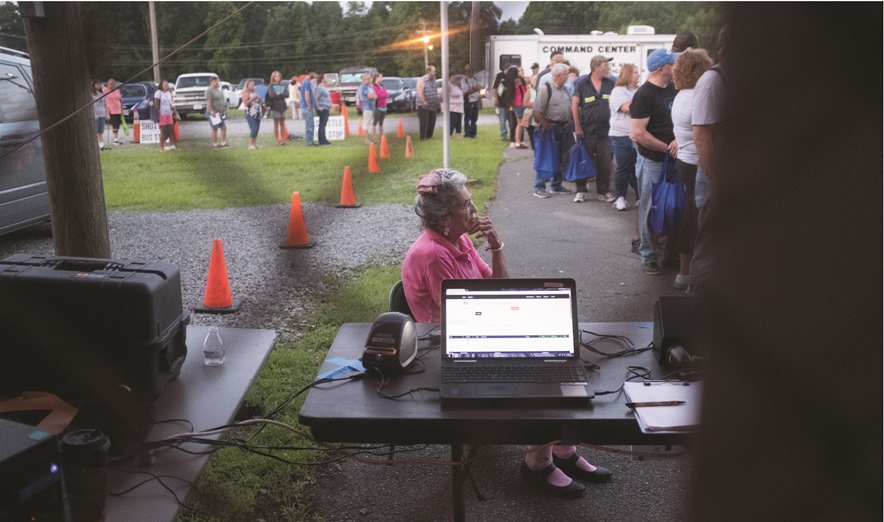
Dorothy waits to enter the Remote Area Medical health event in Wise County, VA. Over the course of the weekend, thousands will be helped.
For one weekend in July, the gates of the Wise County Fairgrounds swing open at 5:30 a.m. Despite the darkness, the humidity and the early hour, there are already 60 people anxiously waiting on the other side. They’ve been on their feet for hours. Some slept in their cars in the parking lot the night before, just to nab a good spot in line. One man even walked there from his home 30 miles away.
The sacrifice is worth it. Making it through those gates means getting help for chronic pain, mysterious aches and persistent ailments. It could even save a life. That’s because on this weekend every year, the Remote Area Medical event (RAM) takes over the fairgrounds, bringing free medical, dental and vision care to a pocket of southwest Virginia that’s starved of such resources. For many in line, this is the only health care they’ll receive all year.
Two decades ago, this part of Appalachia was flush with well-paying coal jobs. All of that changed in the ‘80s when our nation moved away from the kind of coal produced in Virginia. Today, the region is struggling economically. Wise County’s unemployment rate is 8.5% - higher than the national median of 5.0%. And 22% residents live at or below the poverty line, according to data compiled as part of the Healthiest Communities rankings. These rankings looked at all counties nationwide and were developed as a result of a collaboration between the Aetna Foundation and U.S. News and World Report.
Everywhere you turn, you see evidence of this economic decline. Basic infrastructure is crumbling. Local hospitals have shuttered, and many physicians have relocated to more thriving areas, making access to quality care a major issue. The community’s health has been directly impacted: Diabetes, hypertension and obesity are pressing concerns here, as is lung disease – especially black lung, which is common among mine workers. On average, residents live ten fewer years than their counterparts in eastern Virginia and four fewer years than the rest of the nation. And the county’s rate of deaths by suicide, alcoholism or drug overdose is 65% higher than the nation’s, according to the Healthiest Commnunities rankings.
RAM’s mission is to ease such pain and suffering. Now in its 19th year, its event in Wise is the largest medical outreach in the country. To date, more than $27 million worth of free care has been given to 100,000 people, including locals and those who drive as far as 300 miles from surrounding states, including Tennessee, Kentucky, West Virginia and Ohio.
Pulling off the event is a team effort overseen by Remote Area Medical Volunteer Corp and The Health Wagon. The two nonprofits deliver free health care to underserved communities – the former in mobile clinics all over the world, and the latter through stationary and mobile clinics in southwest Virginia. Aetna joined forces with the nonprofits three years ago, sending volunteers and much-needed resources to the event. This year, the Aetna Foundation provided a $40,000 grant to The Health Wagon, and various teams throughout Aetna contributed $26,500 to Feeding America of Southwest Virginia to provide 1,500 boxes of food for attendees.
“To say that this area is underserved would be something of an understatement,” says Sharon Ions, corporate relations director for the Aetna Foundation. “Food insecurity and hunger are pervasive, and poverty, unemployment or under employment are the norm. Virginia’s physician shortage has been well documented, and rural communities in particular are understandably under-resourced in this regard. To have so many segments join forces in support of this undertaking was an illustrative example of the magic that can happen when we work together to build healthier communities.”
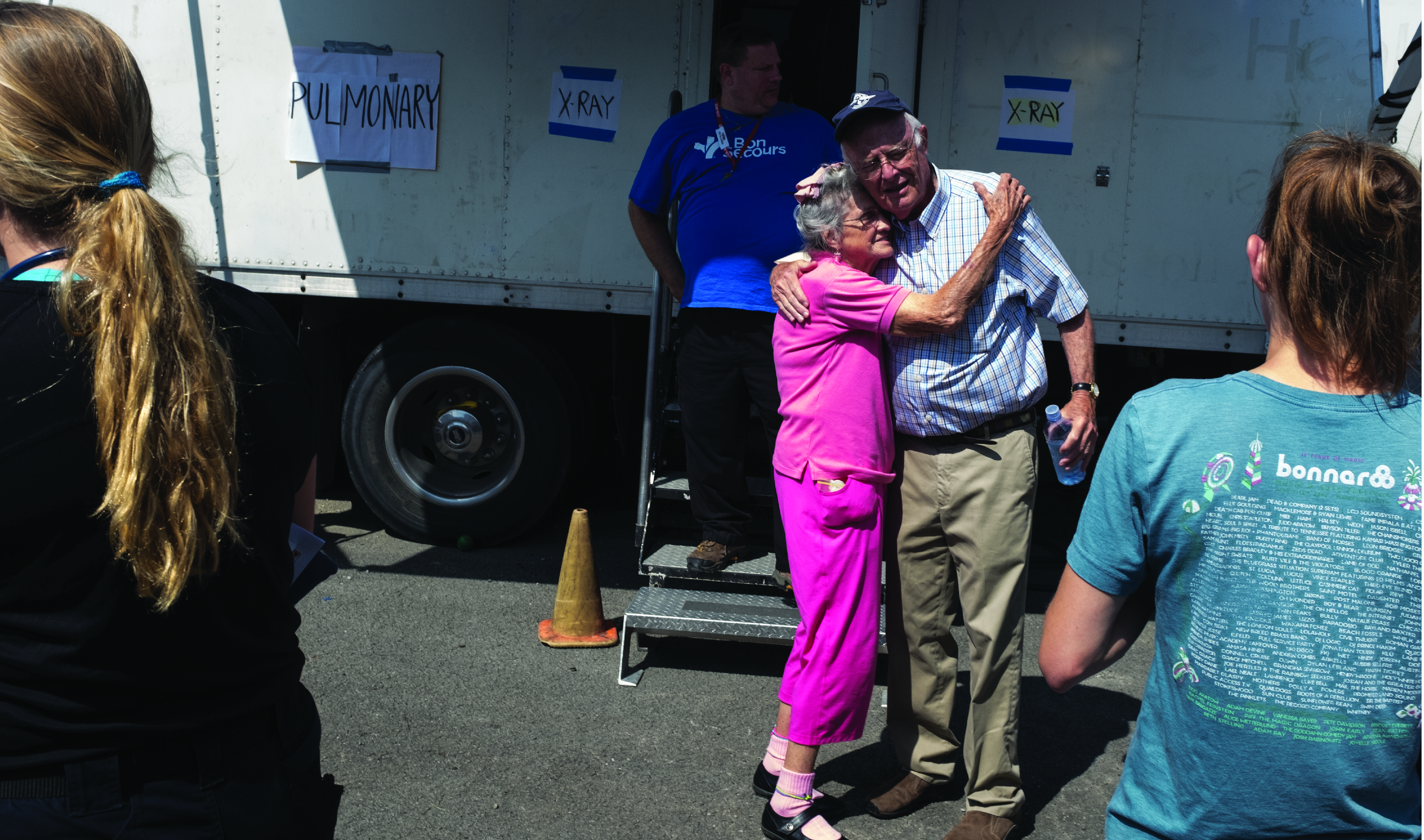
Dorothy embraces Dr. Joseph Smiddy, who first detected her lung cancer at the RAM event ten years ago.
Those in need receive more than top-notch care — they also experience the love, compassion and generosity that’s part of the social fabric of Wise County. Volunteers walk around the crowd to distribute cold water and bag lunches. Veteran attendees help newcomers navigate the hustle and bustle under the tents. Someone brings a therapy dog to entertain folks waiting in line.
The event changes you, participants say — and for the better. To learn how, we asked a volunteer, an organizer and an attendee to describe what the weekend is like and what the experience means to them. Here’s what they had to say, in their own words.
R.J. Briscione, senior director of Aetna Medicaid and RAM volunteer since 2012
“I’ve been a RAM Wise volunteer for six years now, and every year I run the medical registration area. People check in there when they need medical help. And really, everyone needs medical help. Our job is to get them to see the nurses.
“When you’re at the event, you have to switch gears and put away any thoughts of work stuff. Every year, every day, every hour is different, and you have to be ready for whatever is coming. I remember one year, we saw a patient limping on the hot asphalt. He had one shoe on, and his other foot was swollen and bare. We brought him over and got him to medical care. We were also able to look through the donated shoes and find one that fit his other foot. I saw him later that day, and he thanked us. People at the event are so appreciative. Every day I’m there, probably a dozen times a day, people will take the time out and say thanks.
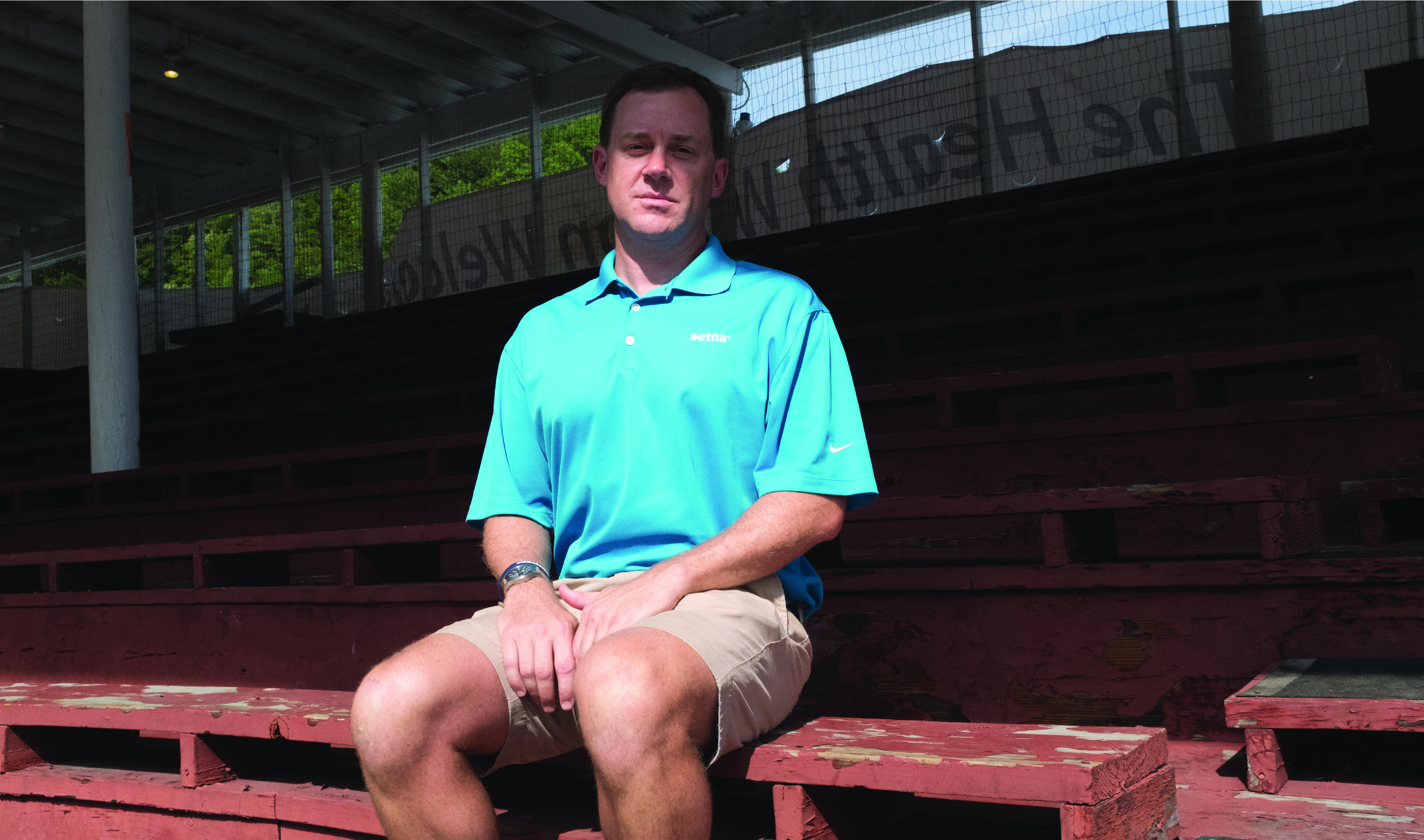
A longtime RAM event volunteer, R.J. Briscione runs the medical registration area and helps patients get the care they need.
“A lot of folks here are struggling. They have to take care of their most immediate needs first, so their health care takes a back seat. Plus, there’s a real difficulty with access to health care here. Dental is a big need. There's probably no adult there with all of their teeth, and most are missing a majority of their teeth. One of my favorite stories is of an older couple I see every year. One year, they both were fitted for dentures. They couldn’t have been happier to have a smile they could be proud of and to be able to eat more things. When you have teeth, you can eat a lot better, a lot healthier.
“Volunteering at this event makes me realize how fortunate I am to have access to great quality healthcare. It’s inspired me to take care of myself — to get to the dentist regularly, stay up to date on annual physicals, cut out sugar, tell my doctor when something doesn’t feel right and exercise. When I first volunteered six years ago, I was overweight. I started a diet right after my first RAM event, lost 40 pounds, and now compete in triathlons. I make sure to do some kind of movement every day. It’s my favorite thing, and it helps with managing stress, too.
“RAM’s founder, Stan Brock, liked to remind everyone that RAM exists to alleviate suffering in the world. If I’m able to help do that in one small part of the world, then I’m happy to give of my time and talents.”
Dr. Teresa Tyson, executive director of The Health Wagon and RAM event organizer since 1999
“Health care is such a crisis here in the mountains. There’s no other place for people to get care other than with The Health Wagon. We’re the only safety net clinic in the region.
“We started this event 19 years ago with Stan Brock, the founder of RAM, because there was such a need for medical, eye and dental care. We’d have patients come in with abscesses and rotting teeth. We’d say, “You've got to get to a dentist.” But they would just come back for more antibiotics, because they couldn’t afford to get their dental needs met.
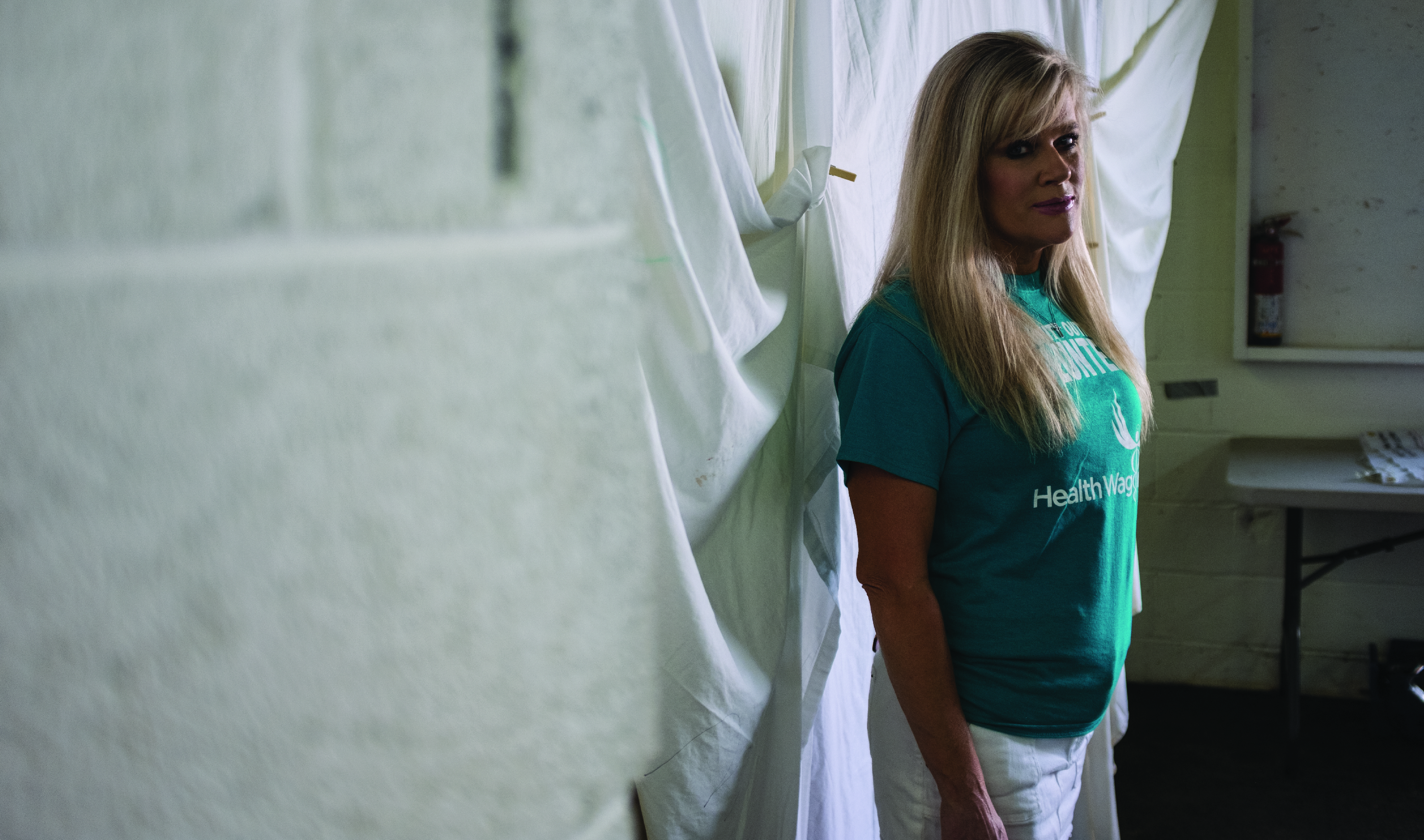
Dr. Teresa Tyson, executive director of The Health Wagon, helped bring the RAM event to Wise County nearly 20 years ago.
“We plan for this event all year long. It’s so large and takes lots of coordination. We’ll help thousands of people over the course of a weekend. We’re doing comprehensive eye exams and making eye glasses on the spot. We’re doing teeth cleanings, fillings, extractions, denture fittings and realignments. We have ultrasounds, x-rays, mammograms and Pap smears. We have emergency rooms set up on site, as well as mobile clinics for cardiology, pulmonology, general x-ray, ophthalmology and physical therapy.
“There are more than 1,400 people helping us out during the weekend. I love seeing all the volunteers. It really warms your heart that there's so much good out there and that we're able to save lives.
“Every day of this event, we’ll let in about 600-700 people. That’s all we can physically handle. What’s unfortunate are the people who are turned back. We don’t know if we’re turning away someone with a brain tumor or lung cancer or breast cancer. We may be turning away someone who needs glasses so they’re able to get to work or is in excruciating dental pain.
“This event looks like something you’d see in a third world country. I think that’s the reason I do what I do. I always wanted to be a missionary. I thought I’d be working in Africa somewhere. But lo and behold, I found my calling here in my own backyard.
“We want to turn things around for the region. I think we're at the forefront of that.”
“My staff and I don’t take any time off after the event. On Monday morning, we start following up with people we saw over the weekend and adding them into The Health Wagon system. We address abnormal labs and diagnostic procedures and provide education and resources on whatever diseases or conditions they’ve been diagnosed with. We’re taking care of these patients for the rest of the year.
It’s a lot of work, but we know we’re changing lives. We want to turn things around for the region, because we face such significant health care disparities here. I think we're at the forefront of that.”
Dorothy T., Wise County, VA, resident and RAM attendee since 2005
“In 2008, I went to the RAM for a mammogram, and afterward, went to the plastic surgeon so he could look at four little cysts in my pinky finger. The doctor said he could take them out, but that they’d need to take blood work and check my heart and lungs. The nurse checked my heart and lungs and said my right lung didn’t sound right. Dr. Smiddy [medical director of The Health Wagon] had a great big van with an x-ray machine, so I went over there and he took an x-ray of my right lung. It had a large mass in it. I took a tuberculosis test at The Health Wagon, but it wasn’t TB. So they sent me to a hospital in Johnson City, TN. Doctors there told me I had a large carcinoma. It’s just a fancy name for cancer. I didn’t know I had it. It was a shock to me. Doctors cut most of my right lung out to get the cancer. I have my lungs x-rayed at The Health Wagon, to make sure it doesn’t come back. Today, I’m cancer-free.
“Those people at RAM saved my life, because I didn’t know I had cancer. They also saved my great-grand baby’s life as well, because I’m alive to raise her. No one else in the family was able to take care of her. She’s 13 years old now.
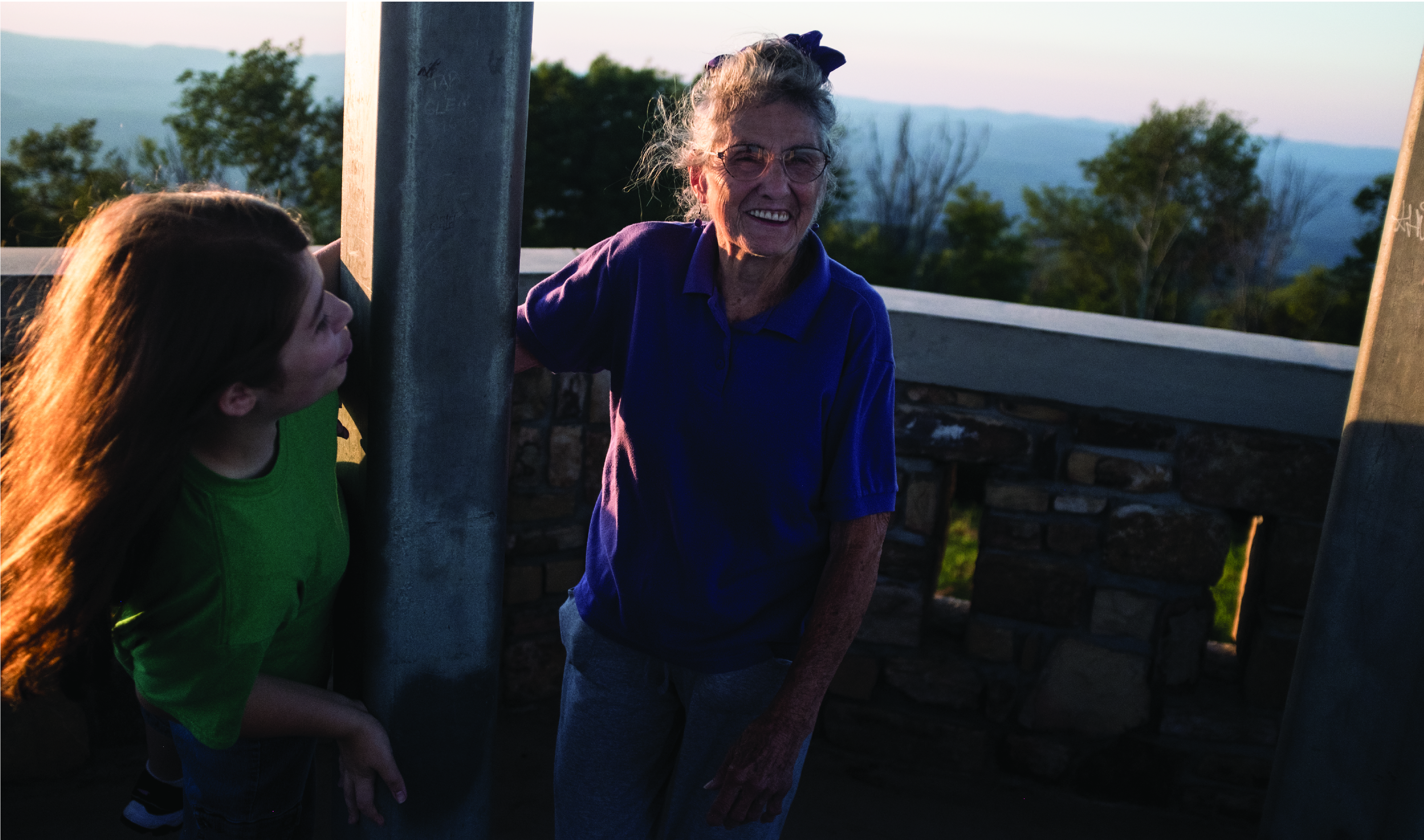
Early detection saved Dorothy's life. Now, she’s raising her great-granddaughter, Jaylynn.
“This event is life to people here, because a lot of people can’t afford medical help and RAM won’t turn you away. There are so many people with bad teeth and all kinds of problems. My son had abscessed teeth, and a lot of other people I know found diseases they didn’t even know they had — like I did.
“This year, I’m going to RAM to get my eyes checked for glaucoma and get my eyeglasses made. They have glass frames there in a big tent, and you go through and pick out the ones you want. They make the eyeglasses right there, in a few hours. You can’t even do that at the doctor’s office, right?
“Every day of the event, there are hundreds of people backed way up, and cars are bumper to bumper. It’s hard to even get a parking place up there. It can be hard to wait in a long, long line, but the volunteer people are doing the best they can.
“In some ways, the RAM event is like the old days because everybody comes together. I see neighbors and friends that I know, and family from Kentucky. You meet people that you haven’t seen in a long time. We just discuss things and have good talks up there while we’re waiting. I get excited just thinking about it.“
*On Wednesday, August 29, 2018 Stan Brock, the Founder and President of Remote Area Medical, passed away. Brock founded RAM in 1968 and since then has brought millions of dollars in free medical care to people in need across the United States. He was a tireless advocate for those in need, and through his leadership, RAM has provided free care to more than 740,000 individuals.
About the author
Bonnie Vengrow is a journalist based in NYC who has written for Parents, Prevention, Rodale’s Organic Life, Good Housekeeping and others. She’s never met a hiking trail she doesn’t like and is currently working on perfecting her headstand in yoga class.